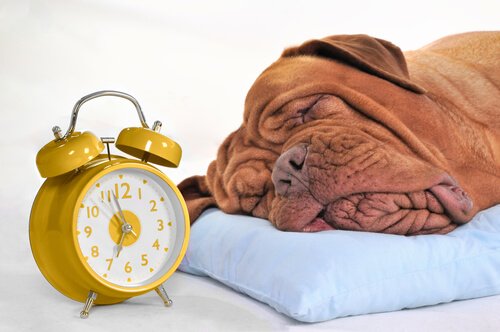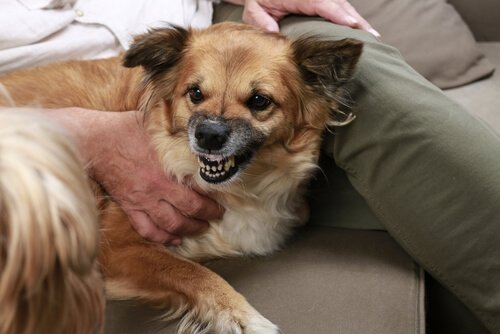How to Help A Dog With Stress


Written and verified by the lawyer Francisco María García
Dogs might feel stress the exact same way as humans do. People mistakenly confuse canine stress with them being nervous or hyperactive. It’s really important to know how to differentiate stress from other things that might be impacting a dog’s health. So, how do you tell if a dog is stressed and how can you help him?
How to detect stress in your dog
When there is a stressful atmosphere at home, your dog is probably feeling it too. Dogs are extremely empathetic creatures, so they easily pick up on their owner’s mood and usually reflect their feelings, such as nervousness, sadness, joy, etc…
- A change in routine can stress out your dog. Things like a new pet, moving to a new home, a trip, the death of a loved one, a lack of exercise or games, and loneliness, are all common causes.
- A stressed dog will show clear signs of it. It will be jittery and easily startled or frightened by loud noises or fast sudden movements. Usually, these factor cause stressed dogs to bark non-stop. The dog might also start having obsessive behaviors like constantly licking itself.
- A healthy dog spends about 16 hours sleeping. If your dog has trouble relaxing, sleeping, or seems restless, this is another sign that indicates he’s dealing with stress.

Strange, aggressive behavior
- A stressed dog might start behaving aggressively towards people or animals. Also, depending on his personality, he might become more shy and fearful than usual.
- One of the most common behaviors of a stressed dog is relieving himself in the house or in strange places instead of doing it outside as usual. It’s because all the stress is sending adrenaline into his bloodstream.
- To get the adrenaline out, some male or even female dogs mount other dogs. Likewise, they can do it an object, or a person’s legs. They’re not doing it out of a desire to mate, it’s just a way to release tension.
- Apathy, indifference, and anorexia are also signs of a dog with stress. They can be extremely damaging to their health, and you should get immediate medical attention if you spot any of these signs.

How to help a dog with stress
If your dog shows one or more of the aforementioned signs or symptoms, you should follow some of the following steps to help it. The idea is to calm the dog down and improve his well-being. As usual, it’s always best to seek advice from the vet when it comes to treating your dog.
- If the stress is related to having a new pet, then make sure not to exclude any of them, especially if you have an older dog. It’s not a good idea to let the new pet use the same plates, bowls, bed, etc. They have to have their own, personal belongings.
- It’s also good to take your dog out on “smell walks.” In other words, you let your dog guide you, not the other way around. This way your dog can stimulate his most important sense (smell) and feel free to explore.
- You can also give your dog a blanket to help him relax, get rid of its tension and fear, and sleep better. This is called “maintained pressure,” and is a common method used by professional trainers.
Games and natural remedies
- Play games that stimulate your dog’s mind, like hiding an object around the house and having him bring it to you. A lot of people think that having their dog play until it’s exhausted is a great way to help it with stress. But in actuality, just exacerbates its nervousness.
- As a complement to games, there are also home remedies known for relaxing dogs, like chamomile, linden, and St. John’s wort. You can make teas out of these herbs and give them to your dog when he eats, or at any other time.
- Aromatherapy, Bach flower remedies, and other homeopathic treatments don’t cause any chemical dependence and don’t alter the effect of other medications. You can use an eyedropper to put them on your dog’s collar, sheets, or on his head.
What really matters when helping a stressed dog is by being patient and affectionate. Likewise, don’t yell at it, be aggressive, exclude, or abandon it. Your dog will notice the care you’re putting in, and he will thank you by calming down and being happy and loving.
Dogs might feel stress the exact same way as humans do. People mistakenly confuse canine stress with them being nervous or hyperactive. It’s really important to know how to differentiate stress from other things that might be impacting a dog’s health. So, how do you tell if a dog is stressed and how can you help him?
How to detect stress in your dog
When there is a stressful atmosphere at home, your dog is probably feeling it too. Dogs are extremely empathetic creatures, so they easily pick up on their owner’s mood and usually reflect their feelings, such as nervousness, sadness, joy, etc…
- A change in routine can stress out your dog. Things like a new pet, moving to a new home, a trip, the death of a loved one, a lack of exercise or games, and loneliness, are all common causes.
- A stressed dog will show clear signs of it. It will be jittery and easily startled or frightened by loud noises or fast sudden movements. Usually, these factor cause stressed dogs to bark non-stop. The dog might also start having obsessive behaviors like constantly licking itself.
- A healthy dog spends about 16 hours sleeping. If your dog has trouble relaxing, sleeping, or seems restless, this is another sign that indicates he’s dealing with stress.

Strange, aggressive behavior
- A stressed dog might start behaving aggressively towards people or animals. Also, depending on his personality, he might become more shy and fearful than usual.
- One of the most common behaviors of a stressed dog is relieving himself in the house or in strange places instead of doing it outside as usual. It’s because all the stress is sending adrenaline into his bloodstream.
- To get the adrenaline out, some male or even female dogs mount other dogs. Likewise, they can do it an object, or a person’s legs. They’re not doing it out of a desire to mate, it’s just a way to release tension.
- Apathy, indifference, and anorexia are also signs of a dog with stress. They can be extremely damaging to their health, and you should get immediate medical attention if you spot any of these signs.

How to help a dog with stress
If your dog shows one or more of the aforementioned signs or symptoms, you should follow some of the following steps to help it. The idea is to calm the dog down and improve his well-being. As usual, it’s always best to seek advice from the vet when it comes to treating your dog.
- If the stress is related to having a new pet, then make sure not to exclude any of them, especially if you have an older dog. It’s not a good idea to let the new pet use the same plates, bowls, bed, etc. They have to have their own, personal belongings.
- It’s also good to take your dog out on “smell walks.” In other words, you let your dog guide you, not the other way around. This way your dog can stimulate his most important sense (smell) and feel free to explore.
- You can also give your dog a blanket to help him relax, get rid of its tension and fear, and sleep better. This is called “maintained pressure,” and is a common method used by professional trainers.
Games and natural remedies
- Play games that stimulate your dog’s mind, like hiding an object around the house and having him bring it to you. A lot of people think that having their dog play until it’s exhausted is a great way to help it with stress. But in actuality, just exacerbates its nervousness.
- As a complement to games, there are also home remedies known for relaxing dogs, like chamomile, linden, and St. John’s wort. You can make teas out of these herbs and give them to your dog when he eats, or at any other time.
- Aromatherapy, Bach flower remedies, and other homeopathic treatments don’t cause any chemical dependence and don’t alter the effect of other medications. You can use an eyedropper to put them on your dog’s collar, sheets, or on his head.
What really matters when helping a stressed dog is by being patient and affectionate. Likewise, don’t yell at it, be aggressive, exclude, or abandon it. Your dog will notice the care you’re putting in, and he will thank you by calming down and being happy and loving.
This text is provided for informational purposes only and does not replace consultation with a professional. If in doubt, consult your specialist.








